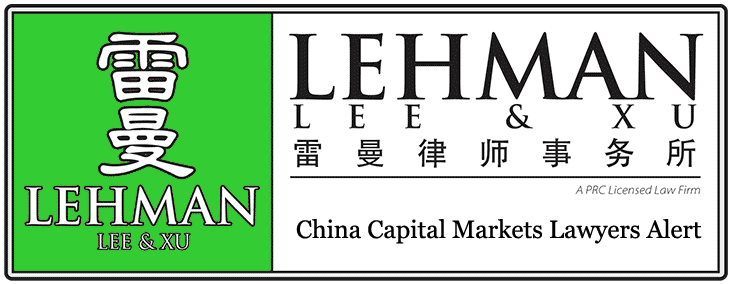

 |
|
LEHMAN, LEE & XU China Lawyers
|
|
China Capital Markets law In The News
|
|
October 2014
|
The China Law News keeps you on top of business, economic and political events in the China. |
|
|
|
In the News |
Chinese investment in NZ housing tipped to rise |
China's plans to ease the restrictions its citizens face when investing overseas will result in increased Chinese capital flowing into New Zealand's property market and contribute to rising house prices, says an economist. The world's second-biggest economy still has a relatively closed financial system, with strict capital controls meaning the sprawling nation - which accounted for 10 per cent of global gross domestic product in 2011 - has a less than 3 per cent share of global holdings of assets and liabilities, according to a Bank of England report. The People's Bank of China, which wants to promote international use of the yuan currency, last week outlined a plan that will allow Chinese nationals to invest in overseas property and stocks through a Qualified Domestic Retail Investor Scheme. No timing was provided for the scheme's launch, nor any indication given of its size, Bloomberg reported. But ANZ's chief China economist, Li Gang Liu, told the Business Herald it was likely to be gradually phased in from later this year and ramped up during 2015. Hong Kong-based Li Gang said the Chinese Government had been pushing its state-owned enterprises to go out into the world through investments and wanted to encourage its citizens to do the same. "The overall trend has been that China would like to encourage more capital outflow," he said. Li Gang said New Zealand was a favoured destination for mainland China-based investors due to the large Chinese resident population here and strong trade ties between the two countries. Investment flows into this country, particularly into property, would increase as capital controls were eased, he said. Li Gang said the effect those flows would have on property markets in cities like Auckland, Sydney and London were likely to become a "very hot topic". China's private wealth reached US$22 trillion last year and will grow to US$40 trillion by 2018, according to Boston Consulting Group. Chinese nationals are officially restricted to the equivalent of US$50,000 a year in foreign exchange, although loopholes sometimes used to get around the law include splitting up large sums of cash into tranches and using friends and family to transfer it abroad. Market commentator Arthur Lim, who has been involved with property investors from mainland China, said they found the prospect of buying freehold property in countries like New Zealand - an opportunity not available in their homeland - very attractive. The Bank of England report said liberalisation of Chinese capital controls could result in China's gross international investment position increasing from 5 per cent of world GDP to 30 per cent by 2025. The impact of Chinese investment on New Zealand house prices, especially in Auckland, has been a hotly debated topic. There is no official register of residential property sales to foreigners, but a BNZ-REINZ survey of real estate agents last year found they accounted for 8 to 9 per cent of total sales. Australians accounted for 22 per cent of all sales to foreigners, followed by Chinese (20 per cent) and British (13 per cent). Li Gang said the New Zealand Government would need to introduce suitable "policy responses" to address a potential increase in Chinese investment in this country's property market. "Chinese money should not [be allowed to] negatively affect local residents' socio-economic welfare." However, Housing Minister Nick Smith said Chinese investment in New Zealand was not significant and was not having a large impact on property values. "In short, I'm not overly concerned," Smith said. Smith said Li Gang's views diverged from those of some local economists who believed foreign investment was not significantly affecting property prices. http://www.nzherald.co.nz/trade/news/article.cfm?c_id=96&objectid=11343693 |
|
|
|
|
| Proud Member of |